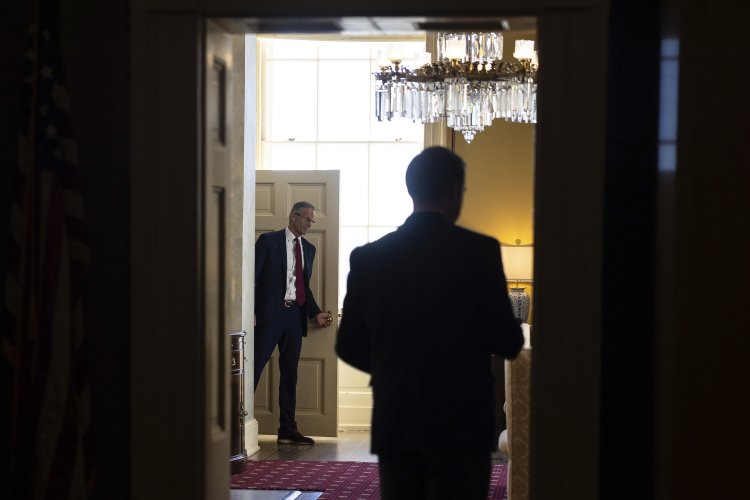Senate Republicans could begin advancing budget proposal as early as Wednesday
GOP leaders are awaiting a crucial ruling on their tax plan. Meanwhile, they are hurrying to demonstrate advancements following several weeks of setbacks.

According to an ambitious timeline considered by Senate Majority Leader John Thune, the Senate aims to approve its budget resolution before the weekend. A lengthy vote-a-rama could begin Thursday, although four anonymous sources familiar with the discussions indicated that it might be postponed until Friday, depending on the speed of the chamber’s proceedings.
To make this plan a reality, the Senate parliamentarian must approve Republicans’ strategy to utilize a current policy baseline approach, enabling them to advocate for trillions of dollars in tax cut extensions while asserting it carries no fiscal cost. Senators are optimistic about obtaining such a ruling from the parliamentarian by Tuesday or Wednesday this week, though a meeting has yet to be arranged. This decision is essential since Republicans cannot finalize their revised budget resolution until they ascertain whether their accounting strategy will be sanctioned.
The push comes as Thune and his leadership team are keen to exhibit progress on the initial step to advance their party-line bill, which encompasses tax cuts, energy, defense, and border policy. Thune aims to promote a new budget resolution that allows the House and Senate to establish their spending cut minimums, deferring conflicts over these and other significant issues to ensure both chambers agree on the same budget resolution ahead of their two-week recess starting April 11. Republican senators have been lobbying Thune to call a vote this week, with White House officials also pressuring during a recent private meeting.
Prior to Wednesday, the “Big Six” budget negotiators, including Thune, Speaker Mike Johnson, Senate Finance Chair Mike Crapo, Ways and Means Chair Jason Smith, Treasury Secretary Scott Bessent, and top White House economic adviser Kevin Hassett, are expected to gather Tuesday for their routine weekly meeting, according to three individuals with direct knowledge of the talks. Senate Republicans will also pursue discussions on their path forward during internal meetings, such as a gathering of Senate Finance Committee Republicans on Monday night and a full conference lunch on Tuesday afternoon.
However, if the parliamentarian rules against Senate Republicans regarding the use of the current policy baseline, it could disrupt the planned timeline. Additionally, GOP leaders continue to seek support for the plan, which has raised concerns among some fiscally conservative members in both chambers. With a 53-seat majority, Republicans can afford to lose three members and still rely on Vice President JD Vance for potential tie-breaking. Thune has yet to publicly comment on the proposed timeline for the upcoming week, emphasizing instead the desire to finalize the budget before the Easter recess.
Sen. John Kennedy mentioned that he is privately advocating for a resolution to be brought to the floor this coming week, despite acknowledging that some of his colleagues remain undecided on supporting it. “The sight of the gallows concentrates the mind — you’ve just gotta make people vote,” he stated. “I don’t think anybody is going to vote against it except one or two, maybe.”
The Senate budget resolution guidelines are projected to instruct committees to cut at least $1 billion when lawmakers commence drafting legislation through the budget reconciliation process. This approach would provide senators with a spending cut floor as low as $3 billion compared to the House GOP’s savings floor of $1.5 trillion. The Senate will not alter the House’s instructions to its committees, leaving in place the House GOP plans for the Energy and Commerce Committee to reduce $880 billion from its jurisdiction, which has raised concerns among certain Republicans about potential deep cuts to Medicaid.
The Senate Finance Committee is also expected not to reflect the House Ways and Means Committee’s $4.5 trillion guidelines. While the Senate aims to ensure the permanence of Trump’s tax cuts, the final figures for the tax portion of the reconciliation bill will depend on the parliamentarian's decision this week. The Senate anticipates adopting a higher defense spending figure — $150 billion for its committee, compared to the House’s $100 billion — and is considering a $5 trillion increase in debt to navigate the party past the midterms without engaging in a politically challenging battle with Democrats to avert a default.
However, Senate Republicans are encountering some dissent within their ranks over setting such a low baseline for eventual deficit reduction targets. Some GOP senators, including typical allies in leadership, are advocating for clearer directives to committees to ensure they meet their savings goals. The party is contemplating an “aspirational” target of $2 trillion in cuts, aligning with House Republicans, though they would not commit to this in the budget resolution.
Sen. Ron Johnson is among a group of GOP senators advocating for a higher spending cut floor than the House’s proposed $2 trillion. To support the budget resolution this week, he seeks a firm commitment from Senate leadership to establish a bicameral panel focused on addressing the deficit and budget issues, warning he will demand greater cuts in the reconciliation bill later this year.
Meanwhile, even if Senate Republicans successfully advance the budget resolution by the end of this week, House GOP leaders express skepticism about finalizing the adoption of the revised plan within their chamber before the mid-April recess. Johnson has mentioned his goal of getting a reconciliation bill to Trump’s desk by Memorial Day, while House GOP fiscal hawks caution that the Senate’s remarkably low spending cut targets “will not be well received.”
Thomas Evans for TROIB News
Find more stories on Business, Economy and Finance in TROIB business












